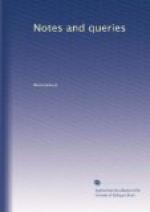FRANCISCUS.
* * * * *
“INCIDIS IN SCYLLAM, CUPIENS VITARE CHARYBDIM.”
I should be sorry to see this fine old proverb in metaphor passed over with no better notice than that which seems to have been assigned to it in Boswell’s Johnson.
Erasmophilos, a correspondent of the Gentleman’s Magazine in 1774, quotes a passage from Dr. Jortin’s Life of Erasmus, vol. ii. p. 151., which supplies the following particulars, viz.:—
1. That the line was first discovered by Galeottus Martius of Narni, A.D. 1476.
2. That it is in lib. v. 301. of the “Alexandreis,” a poem in ten books, by Philippe Gualtier (commonly called “de Chatillon,” though in reality a native of Lille, in Flanders).
3. That the context of the passage in which it occurs is as follows:—
“—Quo tendis inertem
Rex periture, fugam? Nescis, heu
perdite, nescis
Quem fugias: hostes incurris dum
fugis hostem.
Incidis in Scyllam, cupiens vitare Charybdim.”
where the poet apostrophises Darius, who, while {86} flying from Alexander, fell into the lands of Bessus. (See Selections from Gent. Mag. vol. ii. p. 199. London, 1814.)
C. FORBES.
This celebrated Latin verse, which has become proverbial, has a very obscure authority, probably not known to many of your readers. It is from Gualtier de Lille, as has been remarked by Galeottus Martius and Paquier in their researches. This Gualtier flourished in the thirteenth century. The verse is extracted from a poem in ten books, called the “Alexandriad,” and it is the 301st of the 5th book; it relates to the fate of Darius, who, flying from Alexander, fell into the hands of Bessus. It runs thus:—
“— Quo flectis inertem Rex periture, fugam? Nescis, heu perdite, nescis, Quem fugias; hostes incurris dum fugis hostem; Incidis in Scyllam, cupiens vitare Charybdim”
As honest JOHN BUNYAN, to his only bit of Latin which he quotes, places a marginal note: “The Latin which I borrow,”—a very honest way; so I I beg to say that I never saw this “Alexandriad,” and that the above is an excerpt from Menagiana, pub. 1715, edited by Bertrand de la Monnoie, wherein may also be found much curious reading and research.




